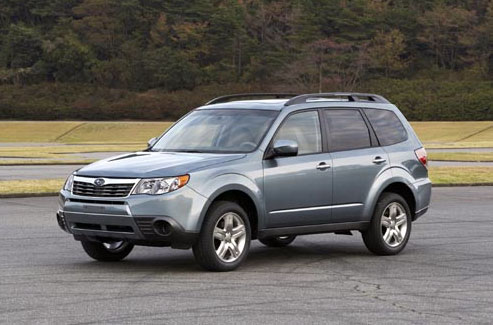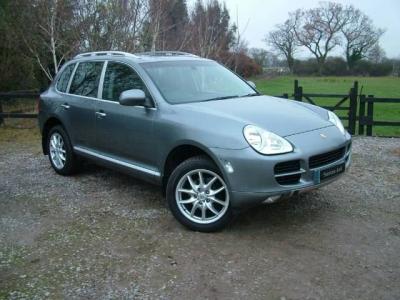Those reading NOH for a while know that Stefan’s car was stolen from in front of our house nearly one year ago. About a month later, when he was fed up with the inconvenient train schedules and the longer commute, Stefan started looking for a new car. He really wanted a 7-series to replace the one that was stolen, but there just weren’t any on the market in the price range we wanted. So he ended up with this:
The Porsche Cayenne is a nice sport SUV, but it would never compare to the BMW…and unfortunately it’s about the least economical car/truck we’ve ever owned. Not only does it guzzle gas, but it also costs a fortune to insure (about 25% more than the 7-series and nearly twice as much as my Defender)…and there’s always the fear of it being vandalized due to its status as a luxury car (even though the BMW was far more luxurious.)
Ever since we bought the Porsche, Stefan has been dreaming of getting another 7-series. Except that none has come our way yet that really compared to the old one.
But lately, he’s been giving some thought of going in a slightly different direction with a practical, economical and still stylish crosssover SUV: a Subaru Forester.

It’s still an SUV but more in the crossover direction, and the costs of ownership is far less than the Porsche.
Positives for the Forester
- A new 2012 Forester costs about the same as our used Porsche Cayenne
- The Forester uses about 7 liters diesel to drive 100km — while the Porsche is upwards of 20 liters when we travel on the highway, and 14-15 liters in the city. We know the gas mileage is pretty accurate because Stefan’s dad has been driving a Forester for the last few years.
- The Forester would be a diesel, which for now is still a bit cheaper than unleaded gas.
- Another major plus is cheap car insurance. For the Forester, we’ll be looking at about half the yearly insurance rate versus the Porsche.
- Better acceleration. It’s hard to imagine, but the Forester actually has more get-up-and-go with its Boxer engine than the Porsche. Obviously if it was a Turbo Cayenne, that would be another story. But a Turbo would also guzzle even more gas.
- Lower to the ground, making it easier for Ayla to get in. She’s not getting any younger and a high SUV like my Defender will some day require a ramp. But at least for now it makes life easier for her.
Similarities
- 4-Wheel Drive — with our winters getting progressively colder and worse, it’s never a bad idea to have a reliable automobile that can get you where you need to go, whether that’s just home from work, or from the other side of the country.
- Cargo space — both don’t have nearly as much space as my Defender, but we have seen on multiple occasions just how much will fit in the back of a Forester.
Cons for the Forester
- No built in navigation system. But I have a portable Tom Tom for my Defender which I rarely use as well. So on the days when Stefan needs to travel somewhere other than work, he can just borrow it…especially since I seldom venture out somewhere that I’m not familiar with.
I’m sure I’m missing something…but those are the important points for us so far. Now we just have to look into selling the Porsche when things settle down a bit.
What do you look for when you’re considering buying a new/used car?




We just bought a Forester and love it! It’s an older model – 2003, but we love the all-wheel-drive in snowy Ohio and like you mentioned, the gas mileage is much better than many other SUVs.
Holy Cr^P! Self-reliant yuppies who blog about being green and saving Euro and seem to find enough disposable income to blow on a vehicle that costs as much or more than the house some people live in. I don’t understand. I’d love to see an explanation right here.
Maybe you should look up the definition of yuppie — a young urban professional, upper middle class or upper class, in their 20’s or 30’s. Living green and sustainable while wanting to save money where we can doesn’t mean that we have to live in poverty. We work extremely hard for what we have and I don’t see a crime in rewarding ourselves for working 70+ hour weeks.
The cars I’m talking about are EUR23,000-25,000 used. Sure, a new version of the 7-series is in the 100,000 range…the Porsche can come close with all the bells and whistles. But I’m not talking about getting one of them new. And I doubt that most people live in a house that costs €25,000.
So, 2 stories about cars. Yes, they do tend to be quite expensive. We have an X3 and after 2 years and one hour of owning it (or so it seemed) the turbo stopped working and then it ended up that the entire engine needed to be rebuilt because of the particle filter (EXPENSIVE). You see, the X3 has a particle filter to burn all the little particles the engine emits to make the car greener. Unfortunalty, the procedure to clean the particle filter means that diesel fuel is injected into the engine which gets really hot and in turn burns the particles. This process CAN NOT be interrupted or else the excess diesel fuel remains in the engine and makes it kaputt, as we found out. When the process starts, you have to keep driving until the excess diesel fuel is burned. This means that when we figure out the particle burning process has started we need to race up and down the autobahn to ensure it ends properly. This is the recommendation from BMW…how´s that for green!!! Moral: check with the dealer to make sure your “driving profile” matches the car or it can get really expensive.
Other story was that on our way back from a glorious 2 Christmas holiday in Florida, we flew from Melbourne airport. Mercedes had a model on display, a 550 coupe for $60K or ca 45K Euro. So you can see…prices are a BIT higher here!